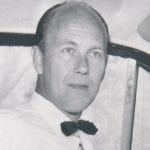 History
History  History
History  Weird Stuff
Weird Stuff 10 Wacky Conspiracy Theories You Will Need to Sit Down For
 Movies and TV
Movies and TV 10 Weird Ways That TV Shows Were Censored
 Our World
Our World 10 Places with Geological Features That Shouldn’t Exist
 Crime
Crime 10 Dark Details of the “Bodies in the Barrels” Murders
 Animals
Animals The Animal Kingdom’s 10 Greatest Dance Moves
 Movies and TV
Movies and TV 10 Box Office Bombs That We Should Have Predicted in 2025
 History
History 10 Extreme Laws That Tried to Engineer Society
 History
History 10 “Modern” Problems with Surprising Historical Analogs
 Health
Health 10 Everyday Activities That Secretly Alter Consciousness
 History
History 10 Dirty Government Secrets Revealed by Declassified Files
 Weird Stuff
Weird Stuff 10 Wacky Conspiracy Theories You Will Need to Sit Down For
 Movies and TV
Movies and TV 10 Weird Ways That TV Shows Were Censored
Who's Behind Listverse?

Jamie Frater
Head Editor
Jamie founded Listverse due to an insatiable desire to share fascinating, obscure, and bizarre facts. He has been a guest speaker on numerous national radio and television stations and is a five time published author.
More About Us Our World
Our World 10 Places with Geological Features That Shouldn’t Exist
 Crime
Crime 10 Dark Details of the “Bodies in the Barrels” Murders
 Animals
Animals The Animal Kingdom’s 10 Greatest Dance Moves
 Movies and TV
Movies and TV 10 Box Office Bombs That We Should Have Predicted in 2025
 History
History 10 Extreme Laws That Tried to Engineer Society
 History
History 10 “Modern” Problems with Surprising Historical Analogs
 Health
Health 10 Everyday Activities That Secretly Alter Consciousness
10 Trivial Incidents That Drastically Changed America
As the 16th century dawned, the New World was revealed as a place of vast possibility for the nations of Europe. Over the following centuries, many trivial, silly, or downright bizarre events ended up carving out a distinctive place—our modern-day United States.
10American Militiamen Are Terrified Of Fireworks And Washington Burns Down

It seems a little silly today, considering that the reckless detonation of colorful explosives has become an American tradition, but it’s true. What we now use to celebrate our independence once scared away all the soldiers defending Washington, and the nation’s capital was burned to the ground.
Following the burning of York (present-day Toronto) by American soldiers in the War of 1812, the British launched a surprise attack on America’s political heart. The battle outside Washington, dubbed the Bladensburg Races, was won by the British thanks to their new weapon: the Congreve rocket. Ironically, the rockets weren’t actually very effective, being notoriously erratic and difficult to aim. Of 7,270 American soldiers, only 26 actually died during the entire battle.
Nevertheless, the untrained militiamen fled from the sheer spectacle of the rockets (“And the rockets red glare . . .”), and nobody stood between the Brits and Washington. They burned the Capitol, White House, and Treasury Building.
So, could any good have come of all this? Well, the destruction had to be repaired. The old ruins were torn down, and construction began immediately on a new home for the President. Thus, like a phoenix, the iconic image of today’s White House rose from the ashes.
9The Turk Lies And Coronado Explores America
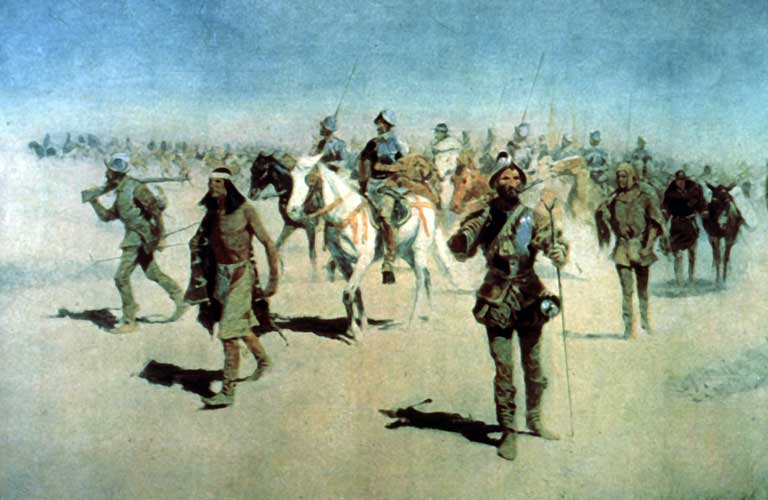
Francisco Vasquez de Coronado is one of those names you hear tossed around in grade school, but why? Well, he was one the first explorers to travel through what is now the American Southwest. He came seeking the famed Seven Cities of Gold, which is why the Native American known as “the Turk” was able to change the whole course of the expedition. With expressive gestures and empty promises of gold, the Turk led the Spaniards past the Grand Canyon, past massive herds of buffalo, and through the rolling plains of the great American West.
So, why lie? It might’ve had something to do with the Spaniards’ growing reputation for promising peace and then slaughtering everyone anyway. By fueling Coronado’s dreams of gold, the Turk was able to lead the Spanish away from his own people and deep into unfamiliar territory, where they risked becoming lost and dying of starvation. In doing so, the Turk knew he would be sacrificing his own life, as Coronado inevitably had him executed once the deception was uncovered.
Still, without the Turk’s lies, Coronado wouldn’t have traveled so far north. He carried to Europeans the first tidings of the rich, mythical land of Quivira—or Kansas, as it’s now known.
8Dushan Popov Likes Whoring Around And The US Aren’t Prepared For Pearl Harbor
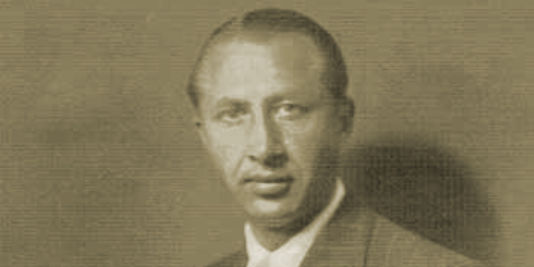
By 1940, Dushan Popov was living a life straight out of a movie—he was a rumored inspiration for Ian Fleming’s James Bond. Popov was supposedly a German spy, tasked with collecting intelligence on America for the Axis Powers. However, the Serbian was actually a double-agent working for Britain. When Popov was assigned to gather information on Pearl Harbor, the British told him to take the information to the FBI immediately, since it strongly suggested that a Japanese attack on the naval base was being planned.
Upon arrival in the States, Popov immediately ran afoul of FBI director J. Edgar Hoover. Instead of being welcomed as the deliverer of vital intelligence, Popov was told he would have to make an appointment and wait to see Hoover. So, in true James Bond style, Popov took a luxurious penthouse and spent the time partying with the rich and famous.
Popov’s indulgent lifestyle and rumored involvement with prostitutes infuriated Hoover, who threatened to throw him in jail for violating the Mann Act. Their meeting was a disaster, with Hoover apparently screaming: “You come here from nowhere and within six weeks install yourself in a Park Avenue penthouse, chase film stars, break a serious law [the Mann Act], and try to corrupt my officers. I’m telling you right now I won’t stand for it.” The Pearl Harbor warning was not forwarded to the military, and the rest is history.
7A Promise To His Wife And A Beloved President Is Assassinated

Many myths shroud the assassination of Abraham Lincoln. To us, it is a sad but inevitable moment in American history. Many don’t realize that fate almost fluttered to another breeze on that day.
Instead of being killed, Lincoln was originally supposed to be kidnapped and taken hostage like an 1865 version of Olympus Has Fallen. After John Wilkes Booth and his fellow conspirators changed their mind, Lincoln reportedly had a dream in which he was assassinated and surrounded by weeping Americans.
The dream stuck in his head, discomforting him to the point that he told his bodyguard, William H. Crook, who advised Lincoln not to go to Ford’s Theater. However, having promised his wife, Lincoln went anyway. Likely obscured into urban legend by time’s passage, many believe Lincoln knew his death was a possibility. Crook swore that the President’s last words to him would forever be burned into his being: Lincoln usually said, “Goodnight, Crook,” but when leaving for the theater on the evening of his death, he said “Goodbye, Crook.”
Strangely enough, Lincoln was actually a fan of his killer, the actor John Wilkes Booth. Booth did not return the sentiment.
6The Railroad Line That Sparked The First Civil War Conflicts

Hailing from Illinois, Senator Stephen Douglas had significant investments in Chicago real estate, which would increase in value if a planned transcontinental railroad had a terminus in the city. Because of this, Douglas advocated a northern route over a southern route for the railroad. You could also argue that Douglas was simply acting in Illinois’ best interests, but come on.
To secure the northern route and its Chicago hub, Douglas had to placate the South’s powerful congressional delegation. To do this, he agreed to repeal the Missouri Compromise, paving the way for slavery to be made legal in the territories of Kansas and Nebraska.
In theory, Douglas wanted the territories to simply decide on the issue of slavery themselves, removing the problem from the national consciousness. In reality, the Kansas-Nebraska Act caused widespread outrage throughout the North and led directly to the period of violence known as Bleeding Kansas. The conflict over Kansas raged so hard that after Senator Charles Sumner condemned slavery, a member of the House nearly beat him to death with a cane on the Senate floor. The Kansas-Nebraska act eventually led to the first conflicts of the American Civil War. And it all started with railroad tracks.
5A Camping Trip Expands The National Parks
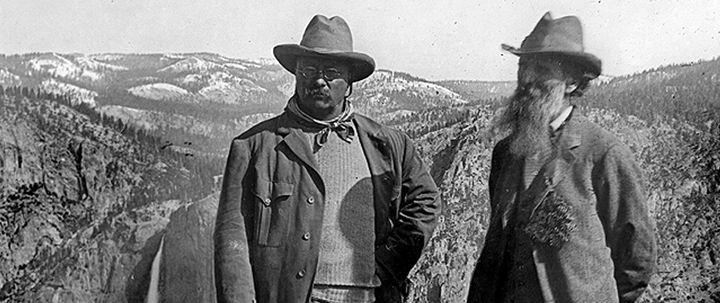
Teddy Roosevelt lives on for many reasons, but they all boil down to this: Everybody could get behind him. He’s a hero to liberals for his creation of a pre–New Deal welfare state, a hero to conservatives for his commitment to military values and his oft-used “big stick diplomacy,” and a hero to everyone who ever thought it was cool that he got shot while giving a speech and talked for for 90 more minutes with blood seeping into his shirt.
However, as history goes on and some condemn Roosevelt for his misuse of military might in Central America, nobody can say that he didn’t do wonders for conservation in the USA. The president protected approximately 230,000,000 acres of public land, setting it aside for 51 Federal Bird Reservations, four National Game Preserves, 150 National Forests, five National Parks, and 18 National Monuments.
So, who convinced the president to do this? As his writings indicated at the time, Roosevelt was concerned by the rapid deterioration of wildlife. Enter John Muir, a conservationist known for roaming through the wilderness and writing about his experiences. Muir invited Roosevelt to go camping with him for four days in Yosemite. Roosevelt accepted, looking forward to a period of solitude in nature. Of course, when he turned up, Roosevelt was greeted by a large gathering of local dignitaries, who invited him to a formal dinner. Undeterred, Roosevelt and Muir made their excuses and slipped away into the wilderness. That night, they slept in the open air and awoke dusted by a light snowfall. For three and a half days the men lived outdoors, as Muir charmed his guest with the simple beauties of the land. As a result, Roosevelt agreed to dramatically expand the National Parks, setting aside the acres of timber for which he is now famous.
4The Norsemen Won’t Trade Weapons And Lose A Colony
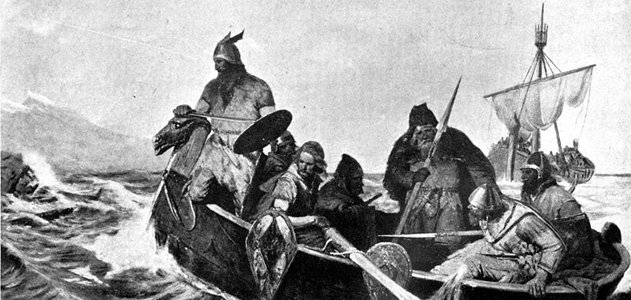
When Thorfinn Karlsefini, a rich Norse explorer, heard news of the dark-skinned “Skraelings” (Native Americans) discovered by previous Norse explorers in the early 11th century, he immediately wanted to trade with them. Karlsefni headed to the New World hundreds of years before the Spanish, French, or English, and he brought along 65 possible colonists.
After first making contact with the Skraelings, Thorfinn ordered his Norsemen not to trade their weapons, instead offering dairy products. At the next trading session, however, one of Karlsefni’s men killed a Skraeling as he reached for a Norse sword. The Skraelings, thinking themselves betrayed, retreated into the forests. Karlsefni feared they would soon return, hostile and in larger numbers.
After some inconclusive skirmishes, the Norse settlement was abandoned, making room for the English, French, and Spanish to move in and colonize. If this hadn’t happened, who knows which way American history would’ve blown. Would American militiamen have been fighting the Norse on the borders of Canada instead of the English in 1812? The world may never know.
3Sweet Cherries, A Dead President, And An Open Japan

In 1852, US Navy Commodore Matthew Perry was dispatched to open Japan to relations with rest of the world—by force, if necessary. This was an extremely important event in world history, and it was made possible by oft-forgotten president Millard Fillmore—who would never have reached office if not for some sweet cherries and an iced glass of milk.
In 1850, President Zachary Taylor had this little snack after a holiday fundraiser. He quickly became ill, and his condition only worsened until his untimely death, most likely due to gastroenteritis from the fruit he’d eaten. Vice President Fillmore took over and made history by dispatching Perry.
Interestingly enough, rumors immediately sprang up that Taylor was actually poisoned by pro-slavery Southerners. Even with today’s technology, the issue is in some doubt—a 1991 review essentially reported that there is no evidence that he was poisoned, and no evidence that he wasn’t.
2The Vice President’s Wife Is A Bully And The Beginnings Of Secession
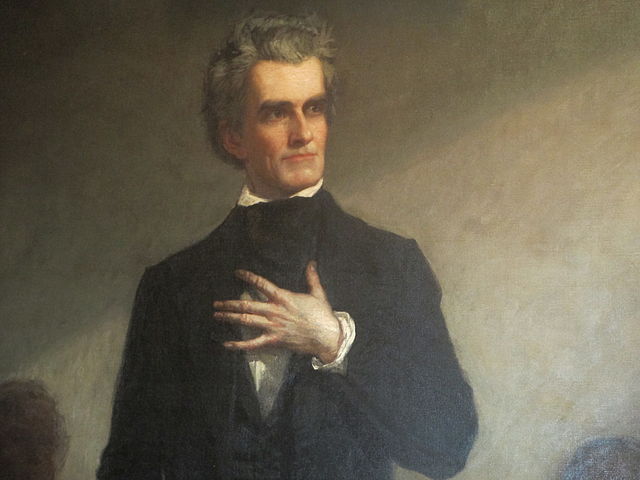
Criminally unappreciated by history curricula everywhere, the Petticoat Affair is one of the most embarrassing (and hilarious) causes of the Civil War.
It all started when John Henry Eaton married widow Peggy Timberlake, shocking American society. See, Peggy hadn’t waited an “appropriate” mourning period by 1830 standards before getting hitched again. Totally and utterly scandalized, Second Lady Floride Calhoun stirred up an “Anti-Peggy” campaign, and many Washington wives snubbed the poor woman.
President Andrew Jackson sympathized with the ostracized couple. His own wife had died shortly after being the subject of appalling accusations from Jackson’s political opponents. Being called an adulteress back then was a truly devastating blow.
Jackson, stuck between a snobby lady and a hard place, appointed Henry Eaton Secretary of War, which only intensified the scandal, driving a wedge between the President and the Second Lady. So when Jackson decided to run for a second term, Martin van Buren became the new Vice Presidential candidate, and Calhoun moved back to South Carolina, where he won a seat in the US Senate and dedicated himself to advocating for states’ rights, slavery, the South, and eventual secession from the Union.
1Severe Constipation Saves The Plymouth Colony
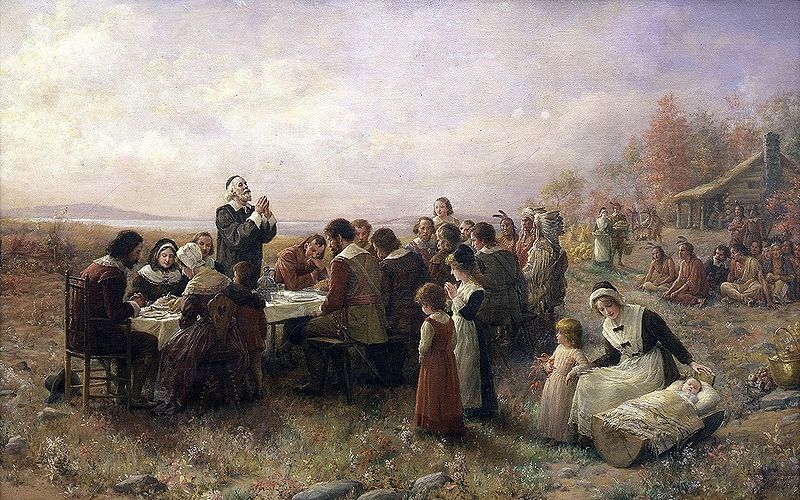
As strangers in a strange land, early American colonists had to walk a fine line in their relations with neighboring Native American tribes. This could make or break a colony—just look at what King Phillip’s War did to the New England colonies in 1675. To survive conflict with the local tribes, Plymouth settler Edward Winslow offered to cure Chief Massasoit of a crippling bout of constipation. Winslow gave the Chief’s mouth a healthy cleaning and fed him a “broth” that was basically leaf-and-corn water.
Massasoit’s subsequent friendship ensured that the Wampanoag remained neutral during the Pequot War in 1636. On top of that, his tribe saved the Pilgrims from imminent starvation. Tisquantum and other Wampanoag taught the starving Pilgrims how to cultivate varieties of corn, squash, and beans, as well as to catch fish and collect seafood. Massasoit was later quoted as saying, “the English are my friends and love me.”
Sadly, that didn’t remain true forever.
Amateur writer/programmer and fan of pop culture, mythology, and history. I aim to write great fiction that draws inspiration from all three. @AlexGartner111 on Twitter.








